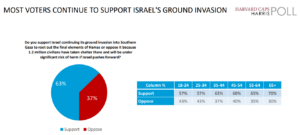On February 27, in an apparent rejoinder against US President Joe Biden’s warning about waning support for Israel’s war against Hamas, Israeli Prime Minister Benjamin Netanyahu cited a recently released Harvard CAPS-Harris poll that indicated that 82% of Americans support Israel.
This was not the first Harvard CAPS-Harris poll that made the news in Israel.
In December, the Israeli media was abuzz with the news that more than 50% of young Americans (18-24) reportedly believed that Israel should be “ended and given to Hamas and the Palestinians.”
While it may seem like these two polls represent a tidal change in American feelings toward Israel over the past two months, an analysis of each Harvard CAPS-Harris poll on Israel and Hamas since October indicates that support for Israel has remained strong among Americans since the October 7 terror attack and that the negative focus on the war in the media and online has not led to a decrease in backing for Israel’s war against Hamas.
WOW:
New Harvard Harris Poll:
– 82% of US citizens express support for Israel, while 18% express support for Hxmas.
– 67% of US citizens indicate they would support a ceasefire only after Hxmas is removed and all hostages are released.
– 63% of respondents support Israel's… pic.twitter.com/m948ZSG6dZ
— Open Source Intel (@Osint613) February 27, 2024
Since the beginning of the war, American support for Israel over Hamas has remained steady at around three-quarters of the population. In October, support for Israel stood at 79%, in November, December, and January, it hovered around 77%, while in February it jumped to 80%.
Surprisingly, among young Americans (18-24), which is traditionally viewed as the population bracket least sympathetic to Israel, support for Israel over Hamas has risen substantially since October. Initially, in the wake of the October 7 attack, support for Israel stood at 52%. By February 2024, it had risen to 72%, nearing the national average.
It’s not only in relation to Hamas that Israel garners a substantial amount of American support.
In October, pollsters asked whether the “land on Israel” [sic] was historically the homeland of the Jewish people or the Palestinian people. Roughly three-quarters of respondents held that it was historically the homeland of the Jewish people, including 56% of young Americans.
Similarly, in December 2023, Americans were asked whether “Israel has the right to exist as the homeland of the Jewish people.” The vast majority responded in the affirmative, including 69% of young Americans.
As this was the same poll in which 51% of young Americans said that they preferred that Israel be ended and given to Hamas and the Palestinians, it is clear that some respondents hold views on Israel that are self-contradictory.
Related Reading: Do Young Americans Really Dislike Israel? A Second Look at the Pew Report on American Views of the Jewish State
As part of this support for Israel over Hamas, a majority of polled Americans have also voiced support for Israel’s war aims (the return of the hostages and the destruction of Hamas). This support does not seem to have been overly affected by the negative representation of Israel’s war conduct in the media or online.
Between October and December (the last month when this question was asked), approximately 60% of Americans supported Israel continuing to fight in Gaza until the hostages are returned and Hamas’ fighting capability was reduced.
Similarly, over that same time period, roughly 80% of Americans said that Israel has the right to defend itself by launching targeted strikes in heavily populated Palestinian areas with proper warnings.
Surprisingly, the number of young Americans agreeing with this sentiment rose almost 20% during those three months, despite the toll on Palestinian civilians caused by Hamas’ use of human shields.
Despite the large street crowds calling for an immediate ceasefire in Gaza, which would ultimately benefit Hamas and weaken Israel’s position, it appears that these loud demonstrations are not representative of the overall American position.
Between December and February, support for an unconditional ceasefire has dropped among Americans, with roughly two-thirds supporting a ceasefire only after Hamas has been removed from power and the hostages freed.
Among young Americans polled in February, 53% support an unconditional surrender, down from 67% in December.
Along with this opposition to an unconditional surrender, a majority of Americans polled in February (including 57% of young Americans) expressed support for Israel continuing its anti-Hamas operations in southern Gaza, despite the effect this might have on the Palestinian civilian population sheltering in that area.

As further proof of how the media’s narrative may not affect Americans’ perceptions of Israel’s war against Hamas, the number of respondents who believed that Israel is committing genocide in Gaza dropped between December and January, despite the focus on South Africa’s case against Israel at the International Court of Justice during that time.
Even though American support for Israel has remained strong, these polls also indicate that, as Gazan casualties mount (primarily due to Hamas’ exploitation of civilian infrastructure), Israel is receiving more of the blame for civilian casualties and the humanitarian situation in Gaza. Nevertheless, the majority of Americans still rightly blame Hamas for these unfortunate consequences of war.
We keep finding out just how entrenched Hamas terrorist are & how they abuse civilians & civilian infrastructure. Here a 10km-long Hamas terror tunnel that passed under a hospital & a university. Hamas used it to move terrorists between brigades. pic.twitter.com/lrjYKGI40q
— Tammy Ben-Haim 🎗️ (@tammybenhaim) February 27, 2024
In sum, despite the heavy focus on Israel’s war against Hamas and the media’s negative portrayal of Israel’s conduct in Gaza, these polls indicate that American support for Israel and its war aims has consistently stayed strong over the past five months of hostilities.
Liked this article? Follow HonestReporting on Twitter, Facebook, Instagram and TikTok to see even more posts and videos debunking news bias and smears, as well as other content explaining what’s really going on in Israel and the region.
Photo Credit: Ruskpp via Shutterstock


